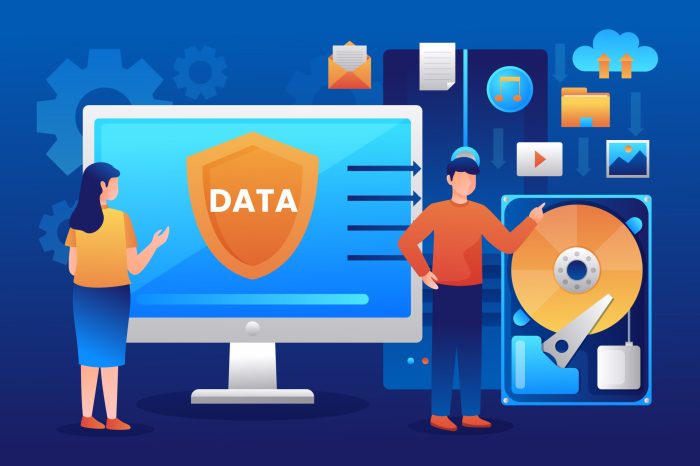Kicking off with Understanding Marketing Data Privacy, this topic dives into the essential reasons why safeguarding consumer data is crucial in today’s digital age. From potential risks of data breaches to the impact on trust and brand reputation, this discussion sheds light on the importance of data privacy in marketing.
Importance of Marketing Data Privacy

In today’s digital landscape, marketing data privacy plays a critical role in safeguarding consumer information and maintaining trust between businesses and their customers. With the increasing amount of personal data being collected and stored by companies, ensuring data privacy is essential to protect individuals from potential risks and threats.
Potential Risks of Ignoring Data Privacy Regulations
Ignoring data privacy regulations can lead to severe consequences for businesses, including hefty fines and legal actions. For example, companies that fail to comply with regulations such as the GDPR (General Data Protection Regulation) may face penalties amounting to millions of dollars. Additionally, data breaches resulting from poor data privacy practices can expose sensitive information like credit card details, passwords, and personal identities, putting individuals at risk of identity theft and financial fraud.
Impact of Data Breaches on Consumer Trust and Brand Reputation
Data breaches not only compromise individuals’ personal information but also erode consumer trust and damage brand reputation. When customers learn that their data has been exposed due to a breach, they are likely to lose confidence in the company responsible for the incident. As a result, businesses may suffer from decreased customer loyalty, negative publicity, and a decline in sales. Rebuilding trust after a data breach can be a challenging and lengthy process, making prevention through robust data privacy measures crucial for maintaining a positive brand image and customer relationships.
Regulations and Compliance
In the realm of marketing data privacy, it is essential for marketers to adhere to key data privacy regulations to protect consumer information and maintain trust. Failure to comply with these regulations can lead to severe consequences for businesses.
Key Data Privacy Regulations, Understanding Marketing Data Privacy
- The General Data Protection Regulation (GDPR): Implemented in the European Union, GDPR sets guidelines for the collection, processing, and storage of personal data of EU citizens.
- The California Consumer Privacy Act (CCPA): Enforced in California, CCPA grants consumers the right to access, delete, and opt-out of the sale of their personal information.
Challenges in Ensuring Compliance
- Complexity of Regulations: Keeping up with the evolving landscape of data privacy laws can be challenging for marketers, especially when operating in multiple jurisdictions.
- Data Security: Ensuring the security of consumer data while using it for marketing purposes requires robust processes and technologies.
- Consent Management: Obtaining explicit consent from consumers to use their data for marketing purposes can be difficult due to varying consent requirements.
Consequences of Non-Compliance
- Fines and Penalties: Non-compliance with data privacy laws can result in significant fines imposed by regulatory authorities, leading to financial losses for businesses.
- Reputational Damage: Violating data privacy regulations can damage the reputation of a brand and erode consumer trust, leading to loss of customers.
- Lawsuits and Legal Action: Non-compliance may also expose businesses to lawsuits from affected consumers, further increasing legal costs and liabilities.
Data Collection Practices: Understanding Marketing Data Privacy
In the world of marketing, data collection is a key practice that allows companies to better understand their target audience and create more personalized campaigns. Let’s dive into some common methods used by marketers to collect consumer data and explore the ethical considerations surrounding these practices.
Common Methods of Data Collection
- Website Tracking: Marketers use cookies and tracking pixels to monitor website visitors’ behavior, such as pages visited and time spent on site.
- Social Media Monitoring: By analyzing social media interactions, marketers can gather valuable insights into consumer preferences and trends.
- Email Marketing: Collecting email addresses through sign-ups and opt-ins helps marketers deliver targeted messages to interested consumers.
Ethical Considerations
- Transparency: Marketers must be transparent about the data they collect and how it will be used to maintain consumer trust.
- Consent: Obtaining explicit consent from consumers before collecting their data is crucial to ensure data privacy and protection.
- Data Security: Marketers need to prioritize data security to prevent unauthorized access or breaches that could compromise consumer privacy.
Impact on Consumer Privacy
- Personalization: While data collection allows for more personalized marketing campaigns, it also raises concerns about invasion of privacy and data misuse.
- Targeted Advertising: Consumer data is often used for targeted advertising, which can feel intrusive if consumers are unaware of how their data is being used.
- Data Breaches: In cases of data breaches, consumer data collected by marketers may be compromised, leading to identity theft and other privacy issues.
Transparency and Consent

Transparency in data collection and processing is crucial for building trust with consumers. It involves clearly communicating to individuals how their data is being collected, used, and shared by companies.
Importance of Transparency
- Transparency helps consumers understand the purpose of data collection and how it will be utilized.
- It fosters trust between companies and consumers, leading to better engagement and loyalty.
- Clear communication about data practices can help mitigate privacy concerns and potential backlash.
Obtaining Consent
Obtaining consent for data collection means getting explicit permission from individuals before gathering their personal information. This can be done through opt-in mechanisms, checkboxes, or consent forms.
- Consent should be specific, informed, and freely given by the individual.
- Companies must clearly explain the purpose of data collection and how the information will be used.
- Consent should be easy to withdraw, and individuals should have control over their data at all times.
Best Practices for Transparency and Consent
- Provide clear and concise privacy policies that are easily accessible to consumers.
- Use simple language to explain data practices, avoiding technical jargon.
- Offer granular choices for individuals to customize their consent preferences.
- Regularly review and update consent mechanisms to ensure compliance with regulations.
Data Security Measures
In today’s digital age, data security plays a crucial role in protecting consumer information from unauthorized access and cyber threats. Implementing robust security measures is essential to maintain the trust and confidence of customers in a company’s ability to safeguard their personal data.
Role of Encryption
Encryption is a key component of data security as it converts sensitive information into a coded format that can only be accessed with the appropriate decryption key. By encrypting data both in transit and at rest, businesses can ensure that even if data is intercepted, it remains unreadable to unauthorized users.
Access Controls
Access controls are another vital aspect of data security, limiting who can view, modify, or delete sensitive information within a company’s systems. By implementing role-based access controls and multi-factor authentication, organizations can prevent unauthorized access and reduce the risk of data breaches.
Other Security Measures
In addition to encryption and access controls, companies should also employ measures such as regular security audits, intrusion detection systems, and employee training on best security practices. By taking a comprehensive approach to data security, organizations can create multiple layers of defense against potential threats.
Examples of Data Security Breaches
– In 2017, Equifax experienced a massive data breach that exposed the personal information of over 147 million consumers. This breach highlighted the importance of robust security measures in protecting sensitive data and the severe consequences of a breach on both consumers and the company.
– Another example is the Cambridge Analytica scandal, where the data of millions of Facebook users was harvested without their consent for political purposes. This breach led to increased scrutiny on data privacy practices and the need for stronger regulations to prevent such incidents in the future.